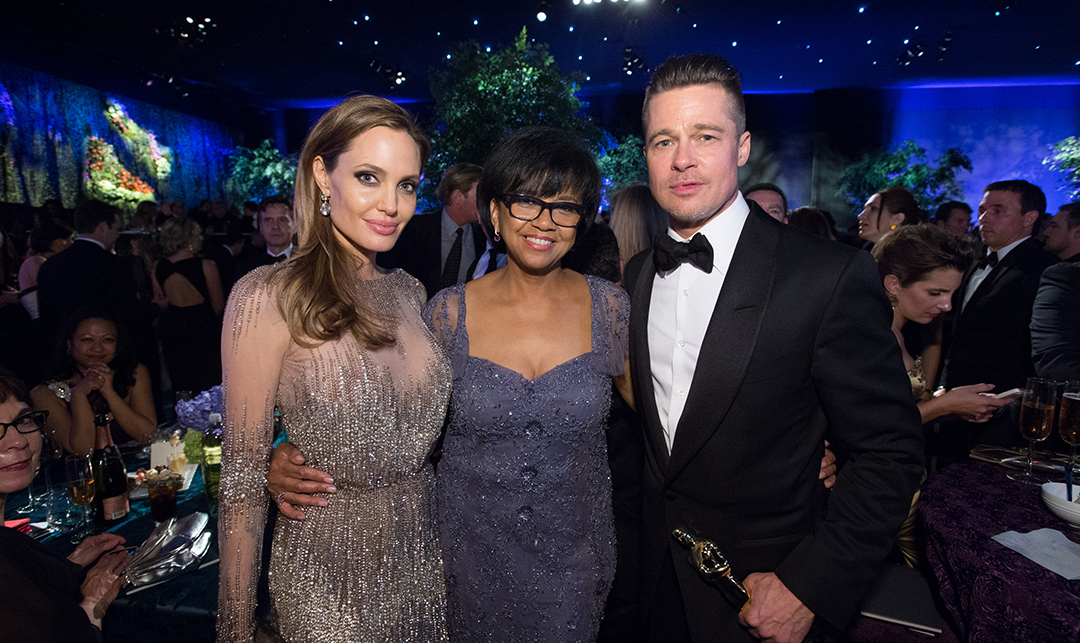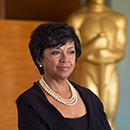Cheryl Boone Isaacs has an infectious love for movies. Ask about one of her favorites, and you’ll see a wistful grin curl the corners of her mouth and a twinkle dance in her eyes. Flipping through your mental Rolodex, you may utter, “I must see that film again,” before returning to the present conversation. Isaacs, smiling, will respond, “Yes, you must.”
Isaacs’ cinematic appreciation is an occupational benefit and necessity. She is President of the Academy of Motion Picture Arts and Sciences – the first African-American and just the third woman to hold that post – and a veteran publicist and film-marketing executive. The Academy promotes the film business globally through The Academy Awards and educational programs both domestically and abroad that attract people to work in the industry. It is in the midst of building a world-class museum in conjunction with the Los Angeles Museum of Contemporary Art, scheduled to open in 2017.
Isaacs guides those efforts at a crucial time. In the past few years, The Academy has been answering its critics, many of whom say its membership and award show do not reflect the diversity of the world’s filmmakers. “We are a global institution,” she points out. “People haven’t thought of us that way, including ourselves … but because of the appetite for entertainment and increased possibilities of viewing, there are a lot of talented filmmakers around the world and we’re making sure we recognize that talent.”
Isaacs’ enthusiasm, coupled with a dogged work ethic, has served her well throughout her career. She previously served as president of theatrical marketing for New Line Cinema, where she guided the marketing of Austin Powers: The Spy Who Shagged Me and Rush Hour. Prior to her years with New Line Cinema, Isaacs was executive vice president of worldwide publicity for Paramount Pictures. There, she created publicity campaigns for Best Picture winners Forrest Gump and Braveheart.
Today, sitting with CSQ in the lounge at the Four Seasons Los Angeles at Beverly Hills, Isaacs remembers an early transcendent film experience. It was 1977 in San Francisco, before she became a film executive. Her older brother, Ashley A. Boone, Jr., who was also a pioneer in the film industry, took her to “a galaxy far, far away…”
“My brother picked me up and as we got close to the theater in San Francisco’s North Point by Fisherman’s Wharf, I remember hearing the buzz,” says Isaacs. “By the time Princess Leia’s ship goes across the screen as it’s pursued by the Empire’s Star Cruiser and the ship kept coming and coming across the screen, we were screaming. You had never experienced anything like that. When it was over we asked to see it again––like right now!”
Boone, Jr. was the first African-American president of marketing at 20th Century Fox, which produced and distributed Star Wars. He was the architect for the film’s marketing and publicity campaign and also managed marketing campaigns for The Empire Strikes Back and James Bond movies. He eventually became the first African-American to hold top marketing positions at United Artists, 20th Century Fox, the Ladd Company, Columbia Pictures, Lorimar Pictures, and MGM. He died of Pancreatic Cancer in 1994 at the age of 55.
While still in high school, Isaacs would visit her big brother at his New York office. She would sit in his office’s screening room and watch movies on which he was working.
“This was the 1960s in New York, so it was very much ‘Mad Men,’” remembers Isaacs. “I was absorbing his lifestyle.”
When Isaacs decided to launch her film-industry career she and her brother decided she would do it without his help. “Early on I told myself to put my head down and just do what I was told, learn as much as I could and not look up for 10 years.”
Her focus impressed bosses and turned them into mentors. One of her first jobs was with Melvin Simon Productions. During her first weeks on the job the company’s president, Milton Goldstein, pointed Isaacs to a bank of file cabinets four feet high and as long as the office wall. He told her to read every paper in every file. She did just that.
“By the time I finished, I knew every project they were working on or had worked on,” recalls Boone Isaacs. “Then I was able to sit in the back of meetings and know who the people were at these meetings and the projects in which they were involved.”
That Boone work ethic was ingrained in Isaacs as she grew up in Springfield, Mass., in a middle-class, mostly African-American community. Isaacs is one of four siblings. While her parents didn’t attend college, going to college was a given for the Boone children. Isaacs, being adventurous, left the East Coast and followed her sister to the Los Angeles area, where she attended Whittier College, attracted by its strong Political Science program. She studied abroad in Copenhagen and after graduating, still wanting to travel, she worked as a flight attendant before entering the film industry.

Sidney Portier and Oprah Winfrey present the Trailblazer Award to Cheryl Boone Isaacs at the Essence Black Women in Hollywood luncheon in February 2013
Since Isaacs became president of The Academy of Motion Picture Arts and Sciences it and its 17 branches, each of which chooses its own membership criteria, has increased its membership and diversity. The 2014 Academy Awards was hosted by comedian and talk show host, Ellen Degeneres, and of the 46 award presenters, 11 were Black or Latino and many nominees and winners were people of color.
Isaacs says it is impossible for the Academy, an organization that represents the global film industry, to ignore the diverse filmmakers throughout the world. The diversity the Academy is beginning to reflect is a result of the industry growing internationally.
“We are actively looking for that talent and recognizing that talent,” says Isaacs. “We have an international outreach committee and have gone to many different countries to attend festivals, meet with filmmakers – last year we went to China, South Korea, Dubai and Mumbai. Through the years, we’ve gone to Vietnam, Rwanda, Iran, and the United Kingdom.”
Isaacs admits there is more work to be done, but her and the Academy’s efforts will be fueled by her love of film and dogged work ethic.
“We preserve the past and we honor the present and we’re going to help shape the future of the film industry,” says Isaacs.













































